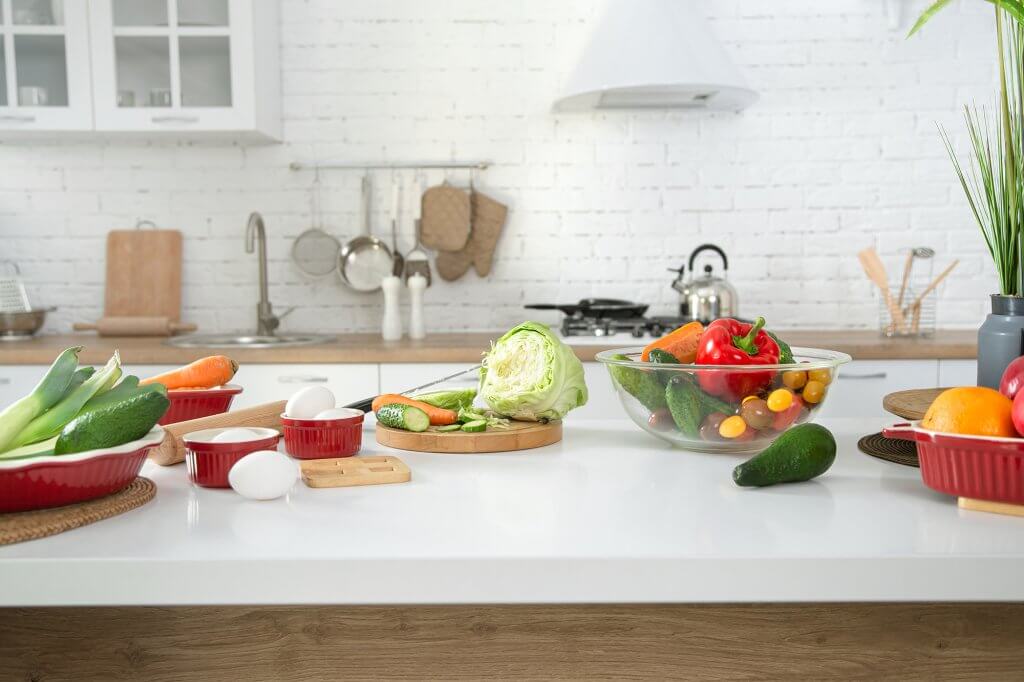
How to Build Your Nutrient-Dense Kitchen
What is a nutrient-dense kitchen? We constantly hear about new diets and ways to lose weight, but there’s little education about nutrients, specifically. It’s frustrating when those diets don’t work out. Why aren’t they working? There could be a variety of reasons, including how you’re preparing food, what you’re buying, and cooking methods. Let’s explore how to prepare your kitchen, cupboards, and body for a nutrient-dense diet!
Cookware
Using the proper cookware can impact the way food is processed. All from heating, using specific types of pots and pans, to appliances. You don’t have to go spend a fortune on your kitchen either! There are ways to set your kitchen up for a nutrient-dense diet AND not break the bank.
- Ceramic, stoneware, cast-iron, and stainless steel pots and pans are best to use for cooking. These types of cookware can handle higher temperatures and don’t contain heavy metals or chemicals.
- Avoid: aluminum, Teflon-based products, and plastic.
- Invest in a good knife set that will sharply cut through the item (dull knives can actually cause nutrients to be lost in the food you’re preparing).
- Store your leftovers in glass containers vs. plastic – plastic toxins can make their way into your food when stored or microwaved.
Any of these recommendations can be done in stages. Start with one thing on the list and then go from there. No need to do it all at once. Your bank account will thank you, and it makes the process less overwhelming.
Oils
The oil we cook with can change or affect the food we eat and how our body responds to it during digestion. There are many different types of oils, and some are better for cooking than others. It all has to do with what happens as the oil is heated. Some have negative reactions to heat and are best as a topping oil, as opposed to cooking or baking with. Below are a list of ideal oils to use and the ones that you should avoid.
- Olive oil, Tallow, Coconut Oil, and other tropical oils are the best to cook with at higher heat. They are able to keep the integrity of the nutrients in the food and how react negatively to high temperatures.
- Medium-temperature cooking/baking oils can include butter and ghee.
- Try to avoid cooking with vegetable oils. Most of them are derived from GMO crops like cottonseed, corn, soybeans, and canola.
Cooking 101
Now that we know what to cook with and the oils to use, let’s dive into methods of cooking! How you cook food and its temperature affects whether nutrients are lost or maintained through the cooking process.
If you’re worried about cooking something from scratch – you got this! Some of the best cooking methods can be really easy to implement. Just try the following steps:
- Heating your cookware to the proper temperature, adding your fat (oils, butter, etc.), then adding the ingredients can not only get you the best results in nutrient content and flavor, but also helps with the clean-up process as well.
- When the fat is added first, it acts as a barrier and non-stick for your ingredients. That helps immensely when it comes to cleanup!
- Preparing food right before cooking will maintain the most nutrients. When certain foods are cut and exposed to oxygen, they start to decrease in nutritional properties.
Nutrient-Density
“Get in b*tches, we’re going shopping!” What does it mean to shop for nutrient-dense foods? It is looking for food that’s packed with nutrients in its natural state without chemicals, pesticides, herbicides, and additives. Food that is organic, seasonally grown, picked at optimal times, and locally shipped is the most nutrient-dense.
Shopping for nutrient-dense foods may sound time-consuming and expensive, but with a few tips on what to look for, you’ll be a pro in no time!
What to Look for:
- Organic.
- This term has taken on a wide variety of popularity. Big industry companies have seen the rise in demand for cleaner products and started labeling foods to coincide without changing any ingredients.
- A product that is truly organic has to go through a certification process for how it’s grown/raised, and processed. Labels that are CERTIFIED ORGANIC by USDA Organic are the most reliable and trustworthy. Labels like “artisan” and “natural” are not regulated products.
- Seasonal.
- Food is seasonal to begin with. It wouldn’t make sense for a watermelon to grow in the winter. That is not its natural climate and therefore artificially or forced into production. Click here for a seasonal food guide.
- Locally sourced.
- When food is locally sourced, it doesn’t have to travel far to reach your table. If it’s traveling long distances, then it needs to be preserved to make the journey and have time in a store to be bought. That can mean additives, preservatives, and other chemicals to increase shelf life. Pro tip: If it doesn’t spoil, it isn’t real food.
 Sam Hendricks is a Nutritional Therapy Practitioner at Castle Hill Fitness! She received her certification as a Nutritional Therapy Practitioner in 2021. She continued her education with the International Women’s Association of Functional Hormone Health to become a Functional Hormone Specialist. As an NTP and IC-FHS, she focuses on a bio-individual holistic approach to balancing health and hormones. Through nutrient-dense foods and lifestyle changes, Sam is able to provide an integrated individual health plan.
Sam Hendricks is a Nutritional Therapy Practitioner at Castle Hill Fitness! She received her certification as a Nutritional Therapy Practitioner in 2021. She continued her education with the International Women’s Association of Functional Hormone Health to become a Functional Hormone Specialist. As an NTP and IC-FHS, she focuses on a bio-individual holistic approach to balancing health and hormones. Through nutrient-dense foods and lifestyle changes, Sam is able to provide an integrated individual health plan.
About Nutritional Therapy
Our Nutritional Therapy services offer you the opportunity to take charge of your health in a supportive environment. Our NTPs take a holistic, individualized approach to address complaints such as chronic pain, conditions, nutrient deficiencies, and systemic imbalances.
Click the button below to connect with Sam and learn more about how Nutritional Therapy can help you!